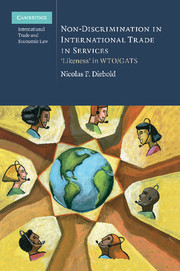Book contents
- Frontmatter
- Contents
- Foreword
- Acknowledgements
- Abbreviations
- List of Cases
- List of Legal Texts
- List of Documents
- Introduction
- PART I Foundations
- 1 Objective and forms of non-discrimination
- 2 Particularities of trade in services and GATS
- 3 Legal elements of non-discrimination obligations
- 4 Concluding summary: reconciling the three elements
- PART II Framing the conceptual breadth of ‘likeness’ in GATS
- PART III GATS specific ‘likeness’ issues
- PART IV Methodology for the ‘likeness’ analysis in GATS
- Bibliography
- Index
1 - Objective and forms of non-discrimination
Published online by Cambridge University Press: 10 January 2011
- Frontmatter
- Contents
- Foreword
- Acknowledgements
- Abbreviations
- List of Cases
- List of Legal Texts
- List of Documents
- Introduction
- PART I Foundations
- 1 Objective and forms of non-discrimination
- 2 Particularities of trade in services and GATS
- 3 Legal elements of non-discrimination obligations
- 4 Concluding summary: reconciling the three elements
- PART II Framing the conceptual breadth of ‘likeness’ in GATS
- PART III GATS specific ‘likeness’ issues
- PART IV Methodology for the ‘likeness’ analysis in GATS
- Bibliography
- Index
Summary
The obligation of non-discrimination constitutes a core principle in many different fields of domestic and international law, such as constitutional law, domestic trade law, human rights, public international law and international economic law. The significance of non-discrimination within the WTO framework is highlighted by the fact that it is embodied in the Preamble to the ‘Marrakesh Agreement Establishing the World Trade Organization’, which names the ‘elimination of discriminatory treatment in international trade relations’ as one of the principal means to achieve the objectives related to trade liberalization.
In general terms, the non-discrimination principle in international economic law serves a political as well as an economic purpose. From a political perspective, discriminating actions in foreign affairs generally, and in trade relations particularly, provoke considerable tensions in international relations. Discriminating actions entail the unequal treatment of two subjects that are equal or in equal situations – either by granting an advantage or favour to one subject or by imposing a disadvantage or burden on the other subject – and are thus naturally perceived as strongly unfair. Such unfair treatment is likely to be answered with repercussions not necessarily limited to trade, and the situation may spiral into a serious quarrel that could ultimately lead to an armed conflict. The best example for illustrating the link between economic integration and political stabilization is the creation of the EU. In today's public debate about the role and purpose of the EU, it is often forgotten that in the aftermath of World War II, the core concern and motivation for the creation of the European Coal and Steel Community (ECSC) in 1951 was to bring stability, prosperity and peace to Europe.
- Type
- Chapter
- Information
- Non-Discrimination in International Trade in Services‘Likeness' in WTO/GATS, pp. 15 - 22Publisher: Cambridge University PressPrint publication year: 2010



